Related Research Articles

Supersessionism, also called replacement theology and fulfillment theology by its proponents, is the Christian doctrine that the Christian Church has superseded the Jewish people, assuming their role as God's covenanted people, thus asserting that the New Covenant through Jesus Christ has superseded or replaced the Mosaic covenant. Supersessionists hold that the universal Church has become God's true Israel and so Christians, whether Jew or gentile, are the people of God.
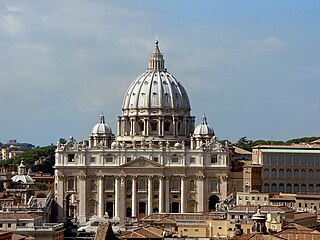
Dei verbum, the Second Vatican Council's Dogmatic Constitution on Divine Revelation, was promulgated by Pope Paul VI on 18 November 1965, following approval by the assembled bishops by a vote of 2,344 to 6. It is one of the principal documents of the Second Vatican Council.

The Catechism of the Catholic Church is a reference work that summarizes the Catholic Church's doctrine. It was promulgated by Pope John Paul II in 1992 as a reference for the development of local catechisms, directed primarily to those responsible for catechesis and offered as "useful reading for all other Christian faithful". It has been translated into and published in more than twenty languages worldwide.
Biblical inerrancy is the belief that the Bible "is without error or fault in all its teaching"; or, at least, that "Scripture in the original manuscripts does not affirm anything that is contrary to fact".
The following outline is provided as an overview of and topical guide to Christian theology:

Raymond Edward Brown was an American Sulpician priest and prominent biblical scholar. He was a specialist on the hypothetical Johannine community, which he speculated contributed to the authorship of the Gospel of John, and he also wrote studies on the birth and death of Jesus.
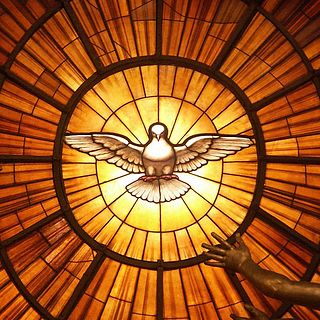
The Catholic Charismatic Renewal (CCR) is a movement within the Catholic Church that is part of the wider charismatic movement across historic Christian churches.
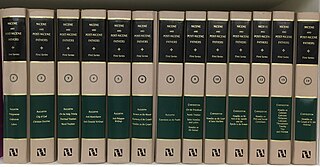
Sacred tradition, also called holy tradition or apostolic tradition, is a theological term used in Christian theology. According to this theological position, sacred Tradition and Scripture form one deposit, so sacred Tradition is a foundation of the doctrinal and spiritual authority of Christianity and of the Bible. Thus, the Bible must be interpreted within the context of sacred Tradition and within the community of the denomination. The denominations that ascribe to this position are the Catholic, Eastern Orthodox, and Oriental Orthodox churches, and the Assyrian churches.

Scott Walker Hahn is an American Catholic theologian and Christian apologist. A former Protestant, Hahn was a Presbyterian minister who converted to Catholicism. Hahn's popular works include Rome Sweet Home and The Lamb's Supper: The Mass as Heaven on Earth. His lectures have been featured in multiple audio distributions through Lighthouse Catholic Media. Hahn is known for his research on Early Christianity during the Apostolic Age and various theoretical works concerning the early Church Fathers.
Allegorical interpretation of the Bible is an interpretive method (exegesis) that assumes that the Bible has various levels of meaning and tends to focus on the spiritual sense, which includes the allegorical sense, the moral sense, and the anagogical sense, as opposed to the literal sense. It is sometimes referred to as the quadriga, a reference to the Roman chariot that was drawn by four horses.

Henri-Marie Joseph Sonier de Lubac, better known as Henri de Lubac, was a French Jesuit priest and cardinal who is considered one of the most influential theologians of the 20th century. His writings and doctrinal research played a key role in shaping the Second Vatican Council.
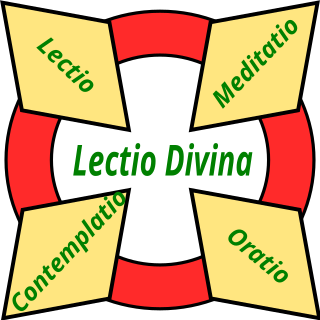
In Western Christianity, Lectio Divina is a traditional monastic practice of scriptural reading, meditation and prayer intended to promote communion with God and to increase the knowledge of God's word. In the view of one commentator, it does not treat Scripture as texts to be studied, but as the living word.

Dual-covenant or two-covenant theology is a school of thought in Christian theology regarding the relevance of the Hebrew Bible, which Christians call the Old Testament.
The Paschal mystery is central to Catholic faith and theology relating to the history of salvation. According to the Compendium of the Catechism of the Catholic Church, "The Paschal Mystery of Jesus, which comprises his passion, death, resurrection, and glorification, stands at the center of the Christian faith because God's saving plan was accomplished once for all by the redemptive death of himself as Jesus Christ." The Catechism states that in the liturgy of the Church "it is principally his own Paschal mystery that Christ signifies and makes present."

Jean-Guenolé-Marie Daniélou was a French Jesuit and cardinal, an internationally well known patrologist, theologian and historian and a member of the Académie française.
Catholic theology is the understanding of Catholic doctrine or teachings, and results from the studies of theologians. It is based on canonical scripture, and sacred tradition, as interpreted authoritatively by the magisterium of the Catholic Church. This article serves as an introduction to various topics in Catholic theology, with links to where fuller coverage is found.
People of God is a term used in the Hebrew Bible to refer to the Israelites and used in Christianity to refer to Christians.
Brian Edward Daley, S.J. is an American Catholic priest, Jesuit, and theologian. He is currently the Catherine F. Huisking Professor of Theology (Emeritus) at the University of Notre Dame and was the recipient of a Ratzinger Prize for Theology in 2012.
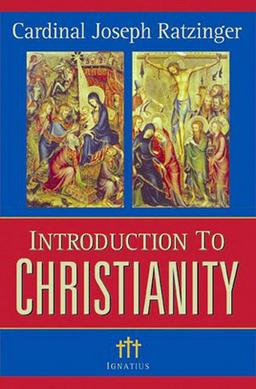
Introduction to Christianity is a 1968 book written by Joseph Ratzinger. Considered one of his most important and widely read books, it presents a "narrative Christology" that demonstrates the place for faith is in the Church. The book offers a "remarkable elucidation of the Apostle's Creed" and gives an "excellent, modern interpretation of the foundations of Christianity".
The Catholic theology of Scripture has developed much since the Second Vatican Council of Catholic Bishops. This article explains the theology of scripture that has come to dominate in the Catholic Church today. It focuses on the Church's response to various areas of study into the original meaning of texts.
References
- ↑ Wilken 2003.
- ↑ Fathers, New Advent.
- ↑ Fathers, New Advent.
- 1 2 de Lubac 1984b.
- ↑ de Lubac 1998.
- ↑ de Lubac 2000.
- ↑ Wood 1998.
- ↑ Danielou 1956.
- ↑ Danielou 1958.
- ↑ Dei verbum, Rome, IT: The Vatican, archived from the original on May 31, 2014.
- ↑ de la Potterie 1988.
- ↑ The Vatican, Rome, IT, archived from the original on 2014-08-16.
- ↑ de la Potterie 1994.
- ↑ Ratzinger 1999.
- ↑ Ratzinger 2007.
- Barber, M (2001), Singing in the Reign: The Psalms and the Liturgy of God's Kingdom, Steubenville, OH: Emmaus Road.
- ——— (2005), Coming Soon: Unlocking the Book of Revelation and Applying its Lessons Today, Steubenville, OH: Emmaus Road.
- Danielou, J (1956), The Bible and the Liturgy, Notre Dame, IN: University of Notre Dame Press.
- ——— (1958), The Lord of History: Reflections on the Inner Meaning of History, London: Longmans, Green & Co.
- de la Potterie, I (1988), "Interpretation of Holy Scripture in the Spirit in Which It Was Written (Dei verbum, 12c)", in Latourelle, R (ed.), Vatican II: Assessment and Perspectives, Mahwah, NJ
{{citation}}: CS1 maint: location missing publisher (link). - ——— (1994), "The Catechism of the Catholic Church: The Section on Sacred Scripture", Communio, 21: 450–60.
- de Lubac, Henri (1984a), "Typology and Allegorization", Theological Fragments, San Francisco: Ignatius Press.
- ——— (1984b), "On an Old Distich: The Doctrine of the 'Fourfold Sense' in Scripture", Theological Fragments, San Francisco: Ignatius Press.
- ——— (1998), Medieval Exegesis, vol. 1, Grand Rapids, MI: William B. Eerdmans.
- ——— (2000), Medieval Exegesis, vol. 2, Grand Rapids, MI: William B. Eerdmans.
- Gaillardetz, R (2004), "Do We Need a New(er) Apologetics?", America, 190: 26–33.
- Gray, T. (1998) Mission of the Messiah: On the Gospel of Luke, Steubenville, Emmaus Road Publishing.
- Hahn, S. (1998) A Father Who Keeps His Promises: God's Covenant Love in Scripture, Ann Arbor, Charis, Servant Publications.
- ——— (1999), The Lamb's Supper: The Mass as Heaven on Earth, Doubleday
{{citation}}: CS1 maint: location missing publisher (link). - Pitre, B (2005), "The 'Ransom for Many,' the New Exodus, and the End of Exile: Redemption as the Restoration of All Israel (Mark 10:35–45)", Letter & Spirit: A Journal of Catholic Biblical Theology, 1.
- ——— (2006), Jesus, the Tribulation, and the End of the Exile: Restoration Eschatology and the Origin of the Atonement, Baker Academic.
- Ratzinger, Joseph (1999), Many Religions – One Covenant: Israel, the Church, and the World, San Francisco: Ignatius Press.
- ——— (2007), Jesus of Nazareth: From the Baptism in the Jordan to the Transfiguration, New York: Doubleday.
- Sri, E. (1999) Mystery of the Kingdom: On the Gospel of Matthew, Steubenville, OH, Emmaus Road Publishing.
- ——— (2005), Queen Mother: A Biblical Theology of Mary's Queenship, Steubenville, OH: Emmaus Road.
- Wilken, R (2003), The Spirit of Early Christian Thought: Seeking the Face of God, New Haven & London: Yale University Press.
- Wood, S (1998), Spiritual Exegesis and the Church in the Theology of Henri de Lubac, Grand Rapids, MI: William B. Eerdmans.